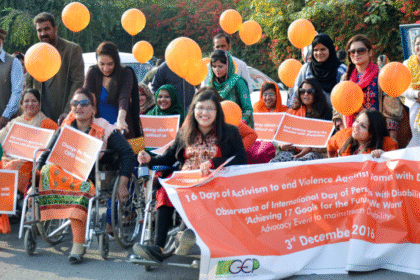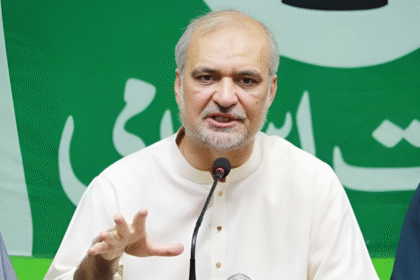Former Prime Minister Nawaz Sharif has once again taken aim at his political rival, Imran Khan, currently jailed amid various legal challenges. Speaking at a check distribution ceremony for the Punjab government’s ‘Apna Ghar Apni Chat’ scheme in Lahore, Sharif echoed sentiments about accountability, asserting that Khan’s current situation is a direct consequence of his actions during his political career.
Renewed Accusations Against the Judiciary
Sharif’s address was steeped in criticisms of both the judiciary and Khan, whom he accused of conspiring against his government in 2017. This year marks a significant point in Pakistan’s political history, and Sharif’s remarks come at a time when tensions between political factions are palpable. He reminded attendees that he was ousted from power by a Supreme Court ruling that he labeled unjust and politically motivated.
In the past, Sharif has consistently held the judiciary responsible for his political demise. He recalled the moment he was disqualified from office and reiterated that five judges played a crucial role in his removal. “These judges removed an elected prime minister for not taking a salary from his son,” Sharif stated, questioning the fairness of such a decision. His rhetoric was not merely a reflection on past grievances but an indictment of the current political landscape that continues to unfold in Pakistan.
The Context of the 2017 Disqualification
Sharif’s disqualification in 2017 came amid the Panama Papers leak, which implicated him and his family in corruption allegations. The Supreme Court’s ruling was a watershed moment in Pakistani politics, sparking a series of events that ultimately led to Khan’s rise. Khan, who capitalized on the narrative of corruption, has often been portrayed as a reformist leader aiming to bring transparency to governance. However, Sharif’s recent comments suggest a deepening rivalry, indicating that the power struggle is far from over.
The Economic Landscape
During his address, Sharif took the opportunity to contrast his tenure’s economic policies with those of Khan’s administration. He claimed that during his time in power, the economy was thriving, with affordable vegetable prices and a general sense of development. “We said goodbye to the IMF, but the subsequent government of my opponents brought it back,” he lamented, suggesting that the economic woes of the current administration stem from the policies implemented during Khan’s leadership.
Sharif’s comments reflect a broader concern among political leaders in Pakistan about the state of the economy. As inflation rises and economic challenges persist, political rhetoric often shifts toward blaming previous administrations for the current crises. Sharif’s narrative positions him as a leader who, despite his own controversies, was committed to the nation’s development.
Addressing Imran Khan’s Legacy
In a pointed remark directed at Khan, Sharif invoked the phrase, “As you sow, so shall you reap,” implying that Khan’s current troubles are a result of his past actions and promises. He recalled how Khan had previously threatened to imprison political opponents, framing him as someone who only fostered chaos and unrest.
Sharif’s criticisms extended beyond rhetoric; he challenged Khan’s accomplishments during his time in office. “What about the 350 dams and the billion tree tsunami?” he asked, questioning the validity of Khan’s claims to have initiated significant projects. This line of questioning seeks to undermine Khan’s narrative as a transformative leader, positioning Sharif as someone who understands the complexities of governance and infrastructure development.
Public Sentiment and Political Responsibility
Sharif also addressed the role of the public in Pakistan’s political turmoil. He remarked that the citizens bear responsibility for the political climate, urging them to reflect on why he was ousted during a period of apparent progress. “Did you ever ask why I was removed when so much good work was happening?” he questioned, suggesting that the public’s inaction has allowed chaos to flourish.
This appeal to the public reflects a broader strategy among politicians to engage with voters on a deeper level. By fostering a sense of collective responsibility, Sharif aims to rally support not just for himself but for the political party he leads, the Pakistan Muslim League-Nawaz (PML-N).
The Punjab Government’s Initiatives
Amid the political turmoil, Sharif highlighted the Punjab government’s ‘Apna Ghar Apni Chat’ scheme as a critical initiative aimed at providing affordable housing solutions. He noted that one million people applied for tractors and 500,000 sought housing, indicating a demand for development and support for the agricultural sector.
Sharif emphasized the allocation of funds aimed at reducing electricity costs and improving infrastructure. He noted, “Fifty-five billion rupees were provided to make electricity cheaper,” and expressed a commitment to transition towards solar energy solutions, signaling an awareness of global energy trends and sustainability.
Critique of Imran Khan’s Policies
In his speech, Sharif did not shy away from criticizing the performance of Khan’s government in key areas such as healthcare and education. He pointed out the lack of facilities in hospitals in Khyber Pakhtunkhwa (KP), Khan’s home province, arguing that the promised development has not materialized. “What have they done for KP? Where are the promised facilities?” Sharif queried, aiming to expose the gaps between Khan’s rhetoric and reality.
By invoking specific failures, Sharif seeks to craft a narrative that not only holds Khan accountable but also portrays his party as a viable alternative capable of delivering on its promises.
The Role of Women in Politics
During the event, Punjab Chief Minister Maryam Nawaz, who also spoke, underscored the importance of women’s empowerment in politics and governance. She highlighted the government’s commitment to public service and reiterated the vision of Nawaz Sharif as being centered on the welfare of the people.
Maryam Nawaz announced a significant allocation of 700 billion rupees for the ‘Apna Ghar Apni Chat’ scheme, emphasizing that the funds would be disbursed over five years. Her statement on providing interest-free loans up to 1.5 million rupees reflects a strategic effort to enhance access to housing and financial support for lower-income families.
Political Implications and Future Outlook
The ongoing verbal exchanges between Nawaz Sharif and Imran Khan underscore a persistent political rivalry that shows no signs of abating. As both leaders navigate their respective challenges—Sharif seeking to rehabilitate his political image and Khan dealing with the repercussions of his actions—the political landscape in Pakistan remains volatile.
The political discourse surrounding accountability, governance, and public welfare is likely to intensify as the country approaches future elections. With economic challenges looming, the electorate will scrutinize the promises made by both parties, particularly as the need for effective governance becomes increasingly urgent.
Sharif’s remarks and the subsequent discussions highlighted the complexities of Pakistan’s political environment, characterized by accusations, counter-accusations, and a continual struggle for power. As citizens watch closely, the upcoming initiatives by the Punjab government will be tested against public expectations and the backdrop of political rivalry.
The focus on housing, economic relief, and healthcare signifies a recognition of the pressing issues facing the populace, but the path forward will undoubtedly involve navigating the intricate political dynamics that continue to shape Pakistan.
#NawazSharif #ImranKhan #PakistanPolitics #PMLN #PoliticalAccountability #PunjabGovernment #HousingScheme #EconomicChallenges







